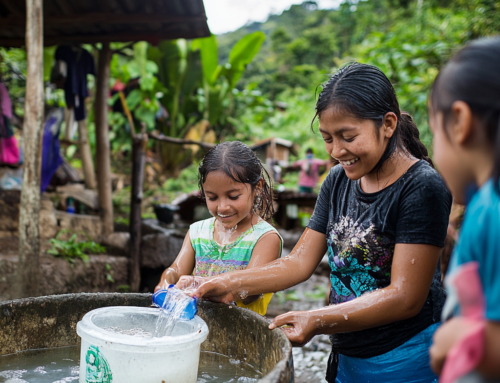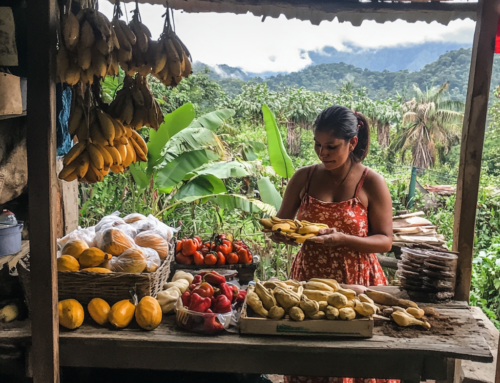Helping ideas from Mike Savage of New Canaan, CT
Central America, comprising countries like Guatemala, Honduras, El Salvador, Nicaragua, and Costa Rica, faces persistent challenges in combating family poverty.
Economic instability, social inequality, and limited access to resources exacerbate this issue.
However, amidst these challenges, innovative approaches are emerging to address family poverty effectively. In this article, we’ll explore some of these innovative strategies and their potential to make a significant impact.
Breaking the Cycle: Innovative Approaches
Here are some fresh approaches gaining traction in the fight against poverty:
- Fintech for Financial Inclusion: Many families lack access to traditional banking systems. Fintech (financial technology) companies are developing mobile banking solutions and digital wallets, allowing families to save securely, access microloans, and participate in the digital economy.
- Climate-Smart Agriculture: Central America is highly vulnerable to climate change. Programs promoting drought-resistant crops, sustainable water management practices, and regenerative agriculture empower families to adapt and build resilience.
- Social Enterprises and Cooperatives: These businesses prioritize social impact alongside profit generation. They can provide families with fair wages, training opportunities, and ownership stakes, fostering economic empowerment. This community-based approach can also help alleviate poverty.
- Investing in Early Childhood Development: Early childhood education unlocks a child’s potential and sets them on a path for future success. Investing in quality preschool programs provides a strong foundation for children from low-income families.
Microfinance and Entrepreneurship
Microfinance initiatives have gained traction as effective tools for poverty alleviation in Central America.
By providing small loans and financial services to low-income individuals, microfinance institutions empower families to start small businesses, generate income, and break the cycle of poverty.
Additionally, programs that offer entrepreneurship training and mentorship contribute to building sustainable livelihoods within communities.
Agricultural Diversification and Sustainable Farming
Agriculture remains a vital sector in Central America, employing a significant portion of the population. However, traditional farming practices often yield limited returns, contributing to rural poverty.
Innovative approaches such as promoting agricultural diversification, organic farming, and implementing sustainable techniques help farmers increase productivity, enhance resilience to climate change, and access higher-value markets. Furthermore, initiatives focusing on women’s participation in agriculture and land ownership rights play a crucial role in poverty reduction.
Education and Skill Development
Investing in education and skill development is fundamental to breaking the cycle of poverty in Central American families.
We previously discussed the role of education in overcoming poverty in Honduras, but education needs to be of social-political import.
Innovative educational programs, including vocational training, adult literacy initiatives, and technology-based learning platforms, equip individuals with the skills needed to secure better employment opportunities and improve their socioeconomic status.
Furthermore, initiatives that prioritize girls’ education and provide support for at-risk youth contribute to long-term poverty reduction and social inclusion.
Social Protection Programs
Effective social protection programs are essential for providing vulnerable families with the necessary support to meet their basic needs and withstand economic shocks. Innovative approaches in this regard include conditional cash transfer programs, which provide financial assistance to families in exchange for meeting certain requirements related to health, education, and nutrition.
Additionally, community-based initiatives focusing on social cohesion, mutual assistance, and solidarity play a vital role in providing a safety net for families facing poverty.
Access to Healthcare and Nutrition
Access to healthcare and nutrition is critical for ensuring the well-being of families in Central America. Innovative healthcare interventions, such as mobile clinics, telemedicine services, and community health worker programs, improve access to essential healthcare services, particularly in remote areas.
Moreover, initiatives promoting maternal and child health, nutrition education, and access to clean water and sanitation contribute to reducing the incidence of preventable diseases and improving overall health outcomes.
Conclusion
Combating family poverty in Central American countries requires a multifaceted approach that addresses economic, social, and environmental factors. By embracing innovation and implementing targeted interventions, governments, NGOs, and communities can create sustainable pathways out of poverty for millions of families across the region.
Through initiatives focused on microfinance, entrepreneurship, agricultural development, education, social protection, healthcare, and nutrition, Central America can unlock its full potential and build a brighter future for generations to come.
ABOUT SAVAGE OF NEW CANAAN, CT
Michael Savage from New Canaan is the Founder of 1-800 Accountant that helps businesses with their accounting services and needs through cutting-edge technology and customer support. He runs the company alongside CEO Brendon Pack.
In his spare time, Savage enjoys creating unique koi ponds, collecting Michael Jordan sneakers, vintage Lego sets, and admiring muscle cars and unique pop art. He and his wife also spearhead the Savage-Rivera foundation to help impoverished families in Honduras.




